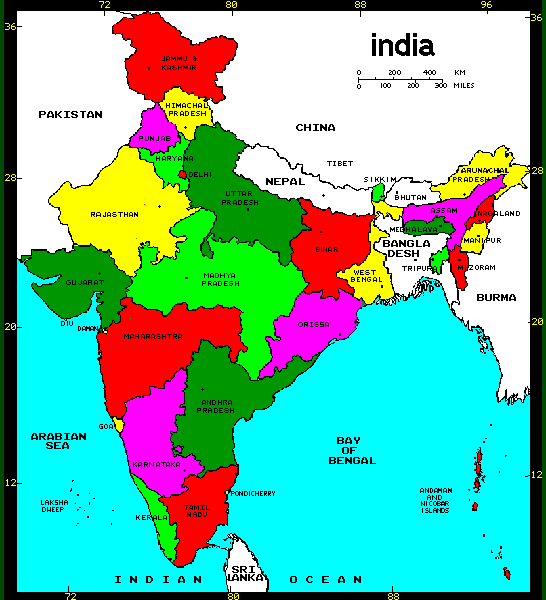The death of meritocracy
50% reservations are unheard-of anywhere on earth (except in South India, of course).The effects of these policies will become swiftly obvious.
When South India pushed "higher castes" out by raising reservations to 80% over the last 30 years, they went to other parts of India.
Now India's meritorious students will go abroad. The best brains will be selectively moved out of the country.
The country will lose.
From Rediff:
The death of meritocracy
May 29, 2006
It was too good to last.
For a little over a decade, it looked really real. At long last, India was getting its act together and was beginning to compete successfully in the global marketplace. The long night of being led by Fabian socialists who were content with the Hindu rate of growth was over. The world was just getting used to the natural business acumen, the intellectual genius, and the creative talents of Indians. Newspapers and business magazines could not refer to China without mentioning India in the same sentence.
Stop the presses. Party's over. Bad news, folks. It's the same old, same old. Just as the world was turning flat, India has decided to retreat into its own spherical bubble of class warfare. The quota raj is over. Long live the quota raj. Plus ça change, at least in Bharatvarsha.
There's nothing in the streets looks any different to me
I'll tip my hat to the new constitution
Take a bow for the new revolution
Smile and grin at the change all around
Pick up my guitar and play. Just like yesterday
Then I'll get on my knees and pray. We don't get fooled again
Don't get fooled again. No, no!
--The Who
We just got fooled again.
In all seriousness, the UPA-Left Coordination Committee's decision to introduce a 27 per cent quota in educational institutions from June 2007 should be viewed as a defining moment in the history of modern India. This is a battle for the very future of India. And the battle is far from over.
While the 'enabling' amendment was passed by Parliament, the actual act of imposing a quota has yet to be passed by Parliament. There is a nation full of young men and women of the Rang De Basanti generation who believe in har desh mahan nahi hota, use mahan banana padta hain (A country can achieve greatness only if its citizens strive to make it great). And there are a few constitutional issues to consider.
The 93rd Constitutional Amendment Bill was expressly passed to roll back the Inamdar ruling of the Supreme Court, which had prohibited state-imposed quotas on unaided educational institutions. Meanwhile, Article 46 of the Indian Constitution requires the promotion of educational and economic interests of Scheduled Castes, Scheduled Tribes and other weaker sections.
Arjun Singh and the UPA Government's claim is that Article 46 in conjunction with the 93rd Amendment Bill requires the government to set quotas on educational institutions for OBCs. Retired Supreme Court Chief Justice Khare has suggested in his comments that the Supreme Court will ultimately decide the validity of this amendment.
Another issue to consider is that the government has chosen to interpret the phrase 'weaker sections' and the term 'classes' to mean the same as 'caste'.
Constitutional experts may have an explanation for this, but Indian citizens should be asking the question as to why 'classes' become the same as 'castes', especially considering that the 2001 Census did not even enumerate any caste other than Scheduled Castes and Scheduled Tribes, which are specifically mentioned in the Constitution.
Defenders of the OBC quota use a variety of arguments to justify them. A fellow IIT alumnus feels that the 'lower classes -- economic as well as thru caste system -- have been deprived for a long time. Society and Government owes them. This will not help better life for everybody as overall prosperity will reduce crimes and other distractions to economic growth.'
It is interesting to note the use of the word 'lower classes' and 'economic as well as thru caste system'. A caste-blind quota system based on economic backwardness would probably be far more in tune with the Constitution and would likely be supported by a much larger segment of the Indian population.
But the idea that society 'owes them' harks back to Ram Jethmalani's speech in Parliament about how 'the present generation, the people of so-called merit must learn that the present society will have to pay for the sins of our ancestors.' It is the reimposition of the quota raj that will slow India's economic growth and ultimately hurt the poor.
Yet another supporter of reservations states that 'if we think we can arrive at a solution to the core issue of denial of opportunity without resorting to reservation, then why have we not done so all these years?'
There is certainly something to be said about giving all applicants an equal opportunity to compete for admission to institutions such as the IITs, IIMs and AIIMS. But the solution for that is not to force quotas at the college level, but instead to improve educational facilities at the primary and secondary school levels.
Of course, that would require Indian politicians to work hard to actually propose and implement something tangible and meaningful. And the vote bank benefits would not come for years, if at all. It should not come as a surprise that the Arjun Singhs and V P Singhs end up choosing the quick fix of mandating quotas at the professional college level.
In the same vein, another IITian has argued that that merit is not solely determined by marks obtained, since many toppers do not do well later in life, and that so-called merit is gained via access to expensive coaching classes such as those in Kota.
On this issue, some IITians have proposed that the IITs, non-profit organisations or the government itself could provide study guides and material to prepare for entrance examinations on the Internet free of cost. If this material is on par with the kind of coaching that the Bansals and the Brilliants (private ecoaching classes that train students for the IIT and medical entrance exams) provide to those who can afford them, the playing field can be leveled for the underprivileged.
Another argument made is that 'quotas are an accepted practice the world over and many NRIs are getting the same benefits especially in the USA.' For one thing, to the extent US universities try to encourage diversity in their incoming classes, the quotas actually work against Indian-American children since they tend to be over-achievers who are rejected because there are too many Asian-Americans who all have to stay within the unspoken quota limits.
In any case, no other country in the world sets quotas for admissions that can reach up to the absurd level of 50 per cent being proposed in India. Even in the US, racial quotas are being challenged in the courts and through the electoral process.
Courts in the US have started outlawing preferences in college admissions and job promotions, and even the fairly benign quota raj in the US is being rolled back, slowly but surely.
One of the most plausible and enticing arguments made in support of quotas by well-meaning intellectuals goes as follows. 'The top 10 per cent aspirants (to the IITs) are on par in their capabilities and the JEE is like an ODI (One Day International cricket game)', therefore, 'there will be no compromise on the standard of students selected' if quotas are enforced.
Thus OBC candidates who are in the top 10 per cent, but not in the currently admitted top 5,444 ranks, would still get a seat in the IITs.
The 'almost as good' argument is probably the most dangerous one being made in support of quotas. This is social engineering at its worst and represents the death of meritocracy in India. Do we want the very best doctors or engineers in the world, or do we want professionals viewed as being the 'almost best'?
Instead of diluting the hard earned reputation of India's top educational institutions, why not set up other colleges and institutions of excellence to admit those ranked from 5,445 to 10,000? This is not a matter of elitism, but instead it is all about building upon the success already achieved.
India was beginning to win precisely because Indians were viewed to be amongst the most talented professionals that any country could produce. Now, while the Chinese are working to make their universities the best in the world, Indian educational institutions will change their mantra to chase the dream of being the 'almost best.'
And the quota proposal is class warfare at its ugliest. In a very insightful column on rediff.com, Francois Gautier asked Are Brahmins the Dalits of today? The answer is an emphatic 'yes', but non-OBCs need not worry, since the sins of this age will surely visit upon the next one.
The reincarnation of Arjun Singh in a coming epoch will demand quotas for non-OBCs, and so the cycle will perpetuate itself. Sort of like the Steinhardt-Turok universe that goes through infinite cycles of expansion and destruction. The sins of the fathers will always visit upon the sons. And Mera Bharat will aspire to be almost, but not quite, Mahan.
Ram Kelkar is an alumnus of IIT Bombay. He is an investment professional at a financial firm in Chicago, IL. The views expressed herein are strictly his personal opinions and they do not represent the official positions of any institution.
... Read more !
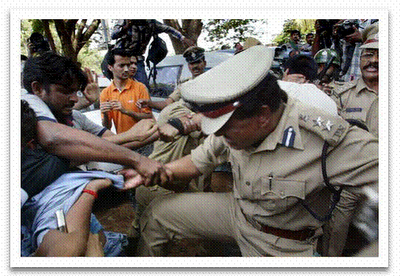

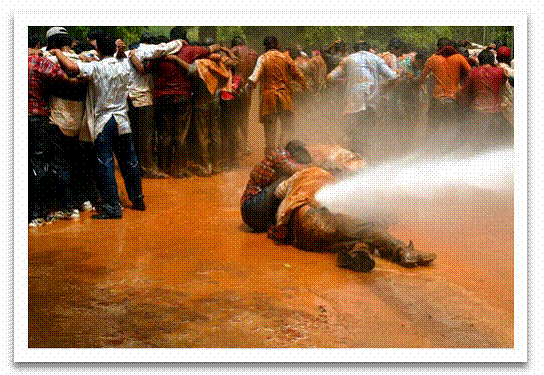
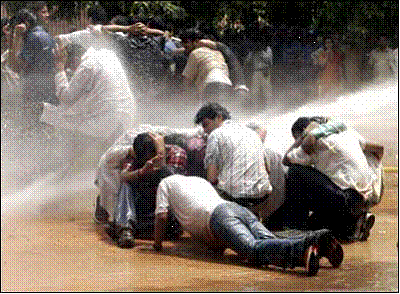
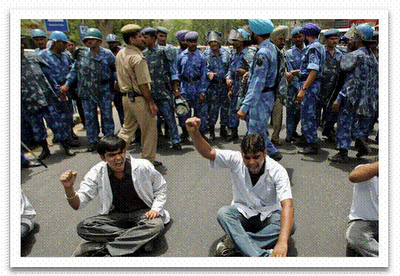










 Do you feel strongly on a topic related to India ? Send me an article writing
what you want to say and I'll publish it on here (let me know if you want
anonymity) ! This blog is for you to express your opinions too !
Do you feel strongly on a topic related to India ? Send me an article writing
what you want to say and I'll publish it on here (let me know if you want
anonymity) ! This blog is for you to express your opinions too !
